School of Thinking
Motivation
The School of Thinking offers transdisciplinary postgraduate studies grounded in philosophy, psychology, and systems theory, applied to the challenges of both personal and professional life. It is based on the recognition that complex social systems, from education and religion to advertising and even science exist with the purpose of teaching us to think in a certain way and accept certain beliefs – often without question. While such systems can be useful or even essential, we believe that a human being is, or can become, more than a standardised product of social and cultural influences.
To outgrow these influences and begin to address them critically requires reshaping one’s own thinking: becoming more independent, more creative, or simply more playful. This process also enables us to take up a more active role in society – to question unspoken norms and rules, to bend or renegotiate them, and to relate to others in more authentic and meaningful ways. This is not an easy task. It involves more than learning new facts, theories, methods, or tools. Rather than reinforcing existing worldviews or simply becoming more effective advocates for them, we aim to help learners broaden their perspectives, embrace alternative viewpoints, and question their underlying assumptions.
This is the purpose of the School of Thinking: a one-year, intensive, transdisciplinary postgraduate journey. We welcome adults of all ages and from a wide range of cultural, academic and professional backgrounds, offering a rich blend of academic and personal learning. Far from being a comprehensive and complete curriculum, the School of Thinking is an ever-evolving, co-creative project that revels in ambiguity and incompleteness, reflecting its intended outcomes.
Objectives
The primary aim of our postgraduate programme is to help students use philosophy, psychology and systems theory in a broad sense to challenge and expand their understanding of themselves and the world – to outgrow rigid simplifications, black-or-white choices, and predefined narratives. It is about stepping out of line on an intellectual and creative level. This goal is supported by:
- Learning multiple languages to think and talk about thinking. The students will be able to draw from rich array of advanced academic frameworks and models (e.g., complexity thinking, systems thinking, dialectics, lateral thinking) to discover new ways of looking at decision-making, problem solving and other, less pragmatic, forms of thinking.
- Facilitating an intense workout for thought. The students will get more accustomed to managing ambiguity and learn to approach it in a more creative manner by applying and evaluating diverse thinking frameworks to ‘wicked’, complex and ill-defined problems.
- Practicing the habit of observing thinking. The students will purposefully observe groups engaged in thinking together as well as their own minds. This practice will make them more sensitive to quality of thinking, and able to appreciate and reinforce extraordinary thinking when it occurs in others and themselves.
- Recognizing and appreciating diversity in thinking. The students will share their thinking with a diverse group of people and practice the art of appreciating other minds. This will provide a space to explore differences more profoundly than in typical social situations, helping to add new points of view to the repertoire of everybody involved.
- Bringing the new understanding into personal and professional practice. The students will be supported in translating their insights into new ways of engaging with their personal and professional lives, expanding and deepening the learning process from the purely intellectual and academic into a more complex, emotional and behavioural experience.
- Learning to think together without losing individual stance (co-worlding).The capacity to develop alternative ways of thinking on (aspects of) the real world is possible not only on a personal but also on a collective level. Students will be invited to exchange and share, to overcome barriers inside themselves and between each other, to become able to co-create new perspectives on complex issues in a playful way.
Programme
The Postgraduate School of Thinking is conducted entirely in English. It takes one academic year (two semesters) to accomplish. The curriculum consists of 750 hours of study, which includes 174 instruction /contact hours and 576 hours of flexibly scheduled individual and group work. The contact hours are divided into intense two-day learning sessions called Twin-Days: a Seed Day and an Explore Day (see the Workflow cohort Tau), most of which are in-person workshops held on the VUB Campus in Brussels.
Contact sessions amount to an average workload of slightly more than 2 days per month (Twin-Days). The additional individual and group work is estimated to take about 3 to 4 days per month, scheduled at students’ own pace. A good rule of thumb is that attending the School of Thinking takes roughly one week of work per month (depending on the individual).
Find out more about the programme here.
Participants
The generalist curriculum of the Postgraduate School of Thinking is designed for working professionals in any career phase, with a wide array of backgrounds who are drawn to complex, ‘wicked’, multidisciplinary, convoluted, and unprecedented phenomena. It is especially suited for those whose impact critically relies on the quality of their thinking.
The (non-exhaustive) list of the professional roles, whose performance can be greatly enhanced by participating in the programme includes: intellectual and organisational leaders, think-tank members, politicians, activists, entrepreneurs, intellectuals, researchers, artists, philanthropists, managers, engineers and designers, as well as consultants, coaches, trainers and teachers who support such professionals in their development.
Feel free to browse the list of alumni and their initiatives to get a sense of who has been thinking with us in past editions.


